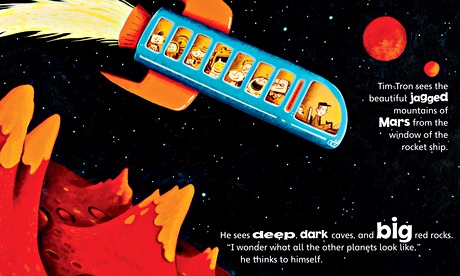Dat er behoefte is aan dergelijke boeken merk ik aan vragen erover die ik krijg via mijn website. Ik ben dan ook al een tijd een lijst aan het maken van boeken die over dit onderwerp gaan. Helaas zijn dit allemaal Engelstalige boeken. In Nederland bestaat er geen enkel boek dat over dit onderwerp gaat. Althans, niet over het onderwerp 'een ledemaat missen'.
Mijn plan is er dan zelf maar een boek over te gaan schrijven, maar dat gaat nog wel even duren.
Voorlopig moeten we het dus doen met de boeken uit Amerika en Engeland.
Tip: The Making of my Special Hand van
Op deze website vind je lesmateriaal voor leerlingen van groep 7 en 8 van het basisonderwijs.
Hier dan het artikel dat ik tegenkwam op The Guardian.
How stories and reading can help teach children about disability
Stories play a huge part in a child's development. Reading to children stimulates their imagination and expands their horizons. But, books also teach children about the world around them. Reading stories together provokes curiosity and discussion, which can be useful when talking to children about disability.
"A year ago my daughter, Molly, became aware her left hand didn't always do the things she wanted it to do," says Emma Birch.
"Her frustration prompted me to look for books to explain in simple terms what cerebral palsy is. But there wasn't anything that was child friendly or presented cerebral palsy in a positive way."
Together with her occupational therapist and disability charity Scope, Birch has now launched Haylee's Friends, a story book about cerebral palsy for young children.
"The story has really helped Molly understand why her body behaves like it does, and it has also helped her share this new understanding with the people she meets," says Birch. "We hope that Haylee's Friends helps other children, their families and friends in the same way."
Books can also help children cope with difficult feelings. Reading about characters who feel the same way lets them understand they're not alone. Learning about other children who have been through similar experiences, especially if they're traumatic, can help children accept their own feelings.
This was one of the ideas behind a new book created by the Children's Trust, a charity for children with brain injuries. Heads Up, Tim-Tron was written by editorial manager Ian Ray, who explains: "How do you tell your child they may not be quite the same again? Thousands of parents across the UK face this problem each year after their child sustains an acquired brain injury.
"One of the issues is the difficulty some children have with their own awareness about their injury and its effects. It's hard for them to address these difficulties if they don't understand them."
Heads Up, Tim-Tron is a children's picture book about a little robot who bangs his head during a football match. Illustrated by award-wining artist Garry Parsons, the book is designed to explain key clinical strategies in a colourful and engaging way. There is also an audiobook version of Heads Up, Tim-Tron recorded by Richard Hammond, who himself sustained a brain injury while filming Top Gear.

Tim-Tron is about a little robot who damages his circuit-board when he bangs his head during a football match. Photograph: Tim-Tron
"We didn't want to have a big, shiny happy ending as, sadly, we know rehabilitation can sometimes be an ongoing process for children," says Ian, who has received an award for innovation from the United Kingdom Brain Injury Forum. "So it was important that our story ended on a cautiously optimistic note. I hope we've achieved that."
Books can also play a useful part in helping siblings of disabled children understand more about a specific condition or impairment. They can help siblings cope with difficult feelings, and give them the words to explain disability to their friends.
Sibs, a charity representing the needs of siblings of disabled people, says many parents put off talking to children about their brother's or sister's diagnosis. They worry that telling a child will be too upsetting or feel that children don't need to know until they're older. However, siblings cope better if they are well informed, and an easy way to start discussions is by looking at a book together.
The charity lists some recommended books for siblings of all ages on its website, sibs.org.uk. There are also useful books on its Young Sibs site, explaining conditions such as autism, deafness, epilepsy, Down's Syndrome, diabetes, and cancer.
But story books don't necessarily need to focus on disabled characters in order to raise awareness about disability, says the disability charity Scope. Scope's In the Picture campaign called for books to include images of disabled children casually or incidentally – the aim being to see disabled children represented in the same way that images of different ethnicities are now the norm.
In the Picture encouraged publishers, illustrators and writers to embrace diversity, so that disabled children were included alongside others in illustrations and story lines. The idea was not to create a separate strand of children's literature tackling disability issues, but simply to promote inclusion.
Following on from the campaign, Scope has produced a list of children's books that feature positive models of disability on its website, scope.org.uk It has also created some image banks to inspire and show what is possible.
Haylee's Friends is available as an ebook on Amazon. Heads Up, Tim Tron is available from The Children's Trust for just the cost of postage and packing. Email thehub@thechildrenstrust.org.uk for more details.
Scope has produced a number of storybooks written with or by disabled people: Wizzy and the Street, Fun in the Sun, and Celine's New Splints.


Geen opmerkingen:
Een reactie posten